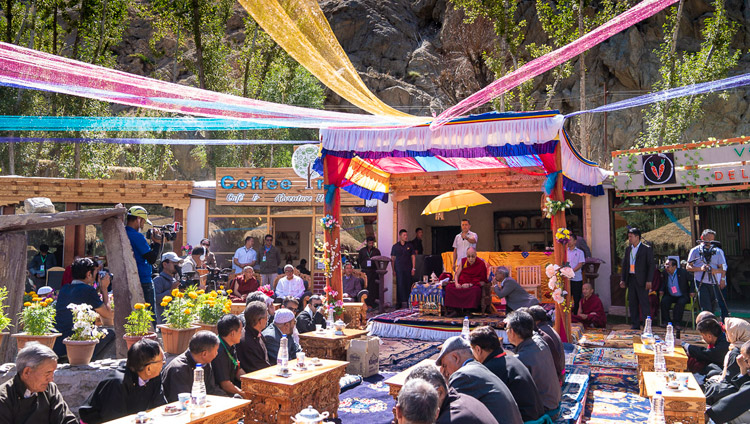When I was last in Leh in September 2017, I was delighted to learn about a new park being constructed by members of Anjuman Moin-ul Islam. Located in the cliffside shadows of Sankar Gompa, Juma Bagh Park is far enough from the bustle and traffic of the bazaar to catch a breath but close enough for a short walk. It also has a rich history–as everything does in Leh: memories of education, of prayer, and of community collaboration. And today, it has the potential to become an achievement for Ladakhi tourism and community access, a rare patch of public green in a desert city.
But Juma Bagh is not only a calm oasis, or a quiet patch of grass away from the dusty roads. According to leaders of Anjuma Moin-ul Islam, the park is meant for families to relax and have fun, somewhere that can be useful for the public as a whole. This includes a wide variety of amenities: food stalls, public halls, an archery center, and even a gym. This publicly-engaged work by Anjuman Moin-ul Islam is intended to reflect the needs, not of tourism, but of the Leh Town community at large. When I visited the site in 2017 while it was still under construction, the space already felt like nowhere else in Leh. The closest that came is a government operated park in the city center, where archery competitions and festivals are sometimes held. The goal is to make this park available to all people in Leh, who may come for the food or for the rest, but stay for the open space and the company.
The role of public parks is indisputably for the greater good. Parks provide recreation and respite, and most importantly to modern urban planning, are intended for public use. No need to pay an entrance fee, just walk in and take a rest. Not only that, public space often serves as a center of community building and collaboration. Because it is a space for anyone (at least in theory), parks can be a much-needed space of public engagement. India often lacks these spaces, particularly outside of middle and upper-class enclaves. In The Wire‘s reporting on disruptions of namaz in Gurgaon in 2018, professors Tathagata Chatterji and Souvanic Roy saw decrease of access to public parks as a decrease of potential political engagement. They said,
The very idea of the urban public space as a forum for democratic deliberations, discussions and debates rests on the notion of acceptance of the ‘other’, pluralism, multiculturalism, and the rights of the people over the city. The decline of meaningful public spaces, therefore, weakens opportunities for participatory democracy.
Juma Bagh opened to great fanfare in 2018. The Dalai Lama was invited to inaugurate the park, and a shop owned and operated by handicapped community members was highlighted to express what aspirations the community has for its shopkeepers and participants. As of right now, the park’s food stalls (the Ladakh Haat Juma Bagh) are receiving five star reviews on Google Maps. While I hope to explore more of the history and heritage of Juma Bagh once I return to Leh, I’m sure that even in its inaugural year, the park will provide a much-needed public space for Ladakhis and visitors alike.
